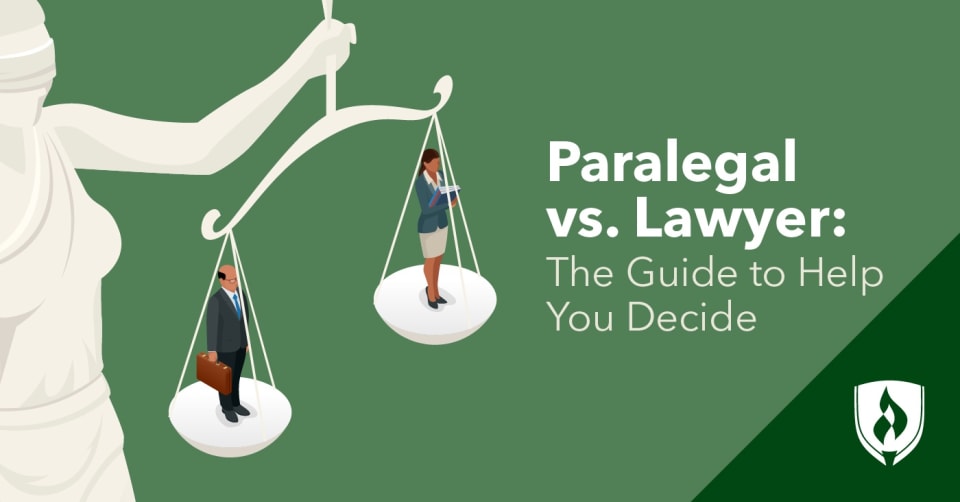
What’s the difference between a lawyer and a paralegal? Well to start: the number of jokes made at their expense. All kidding aside, there are plenty of factors to compare and consider between these two legal careers that are far more important than the number of times each ends up as the butt of a joke. Both paralegals and lawyers play an important role in our legal system, but it’s understandable if you’re a little unsure of the details surrounding each role.
Whether you’re trying to compare potential future careers or just curious about who’s who in the legal system, you’ve come to the right place. We’re here to compare paralegals versus lawyers, highlighting the differences in salary, career outlook, job duties and education required for each.
There are some substantial differences between these roles, with pros and cons associated with each. You’ll want to weigh the good and the bad if you’re evaluating a potential legal career path. Use this information to help you start your research.
Paralegal vs. lawyer: Job duties
The duties performed by paralegals and lawyers have a fair amount of overlap—both conduct research and prepare legal documents. Paralegals often do a lot of the legal legwork and preparation for a case. This includes investigating the facts of a case, writing reports, filing and organizing important paperwork, and scheduling times for interviews and depositions, to name a few.
Both lawyers and paralegals can expect to work long hours with urgent deadlines at times. This is important to know ahead of time if you don’t hold up well to pressure or aren’t looking for a potentially stressful career.
One major difference in paralegal versus lawyer job duties is in the courtroom. Lawyers are front and center when addressing the judge, jury or witnesses. The high-profile nature of being a lawyer can seem glamorous, but it also brings a lot of scrutiny and pressure. One small misstep can have an outsized effect on the outcome of a case.
That’s not to say being a paralegal is stress free—mistakes in your prep work can be just as detrimental, but you typically have a layer of protection in the form of a supervising attorney. Another notable difference between paralegals and lawyers is that only lawyers can set fees, give legal advice, appear in court and sign legal documents.
This means that even though a paralegal may have done a significant portion of the prep work, the recognition—positive or negative—often falls on the lawyer presenting the work.
Paralegal vs. lawyer: career outlook
While the BLS projects employment of lawyers to grow four percent through 2029—on par with the national average for all occupations—the BLS notes competition for jobs remains stiff as there are currently more law school graduates than positions available.1
The job market for recent law school graduates has seen some strong shifts in recent years. The National Association for Law Placement (NALP), an organization that studies and tracks law school outcomes, found that 67.7 percent of 2016 law school graduates surveyed were working in positions that require passage of a state bar examination.2 The good news for prospective lawyers is that there has been somewhat of a market correction since then. In 2019, NALP found that 76.2 percent of 2019 law school graduates were working in jobs that require bar passage.3 While that’s a substantial improvement, it does come with a caveat: The pool of graduates was smaller overall.3
On the other hand, the BLS projects paralegal employment to increase 10 percent from 2019–2029.1 The BLS explains that part of this demand is driven by large law firms and corporations looking to lower their legal expenses, so they have been hiring paralegals to do a higher percentage of legal work.1 With this shift, some of the legal work that would have been the domain of entry-level lawyers in the past is now on the plate of paralegals. This trend extends beyond law firms, as well. Large organizations are turning to staffing their own legal departments in-house as a way to save on the high costs of retaining outside counsel.
Paralegal vs. lawyer: Education and training required
The training to become a lawyer requires much bigger commitments of both time and money than what it takes to become a paralegal. Most lawyers spend seven years in school (assuming it takes four years to earn an undergraduate degree and another three years to complete law school). Paralegals often need an Associate’s degree.
After earning their undergraduate degree, would-be law students are required to take the Law School Admission Test (LSAT) as part of the application process to law school. There’s no guarantee they’ll be admitted, either—top law schools are very selective. The tight job market for lawyers is also reflected in the competitive nature of law school. Future lawyers compete to attend the best possible school. Once they’re in school, they jockey with classmates to graduate at the top of their class in the hopes of landing a job at prestigious firms.
Another differentiator—and potential stumbling block—for lawyers is the requirement to pass the bar examination in the state in which you intend to practice. The exact format of this test can vary by state but generally includes a mix of essay and multiple-choice questions designed to gauge your understanding of the law both in general and within the state you choose to practice. Passing the bar examination in your state is definitely not a given. Minnesota, for instance, reported an overall bar exam pass rate of 82.63 percent in the Summer of 2020.4 With that much invested into becoming a lawyer, failing to pass the bar examination can leave you in a challenging state of career limbo until you’re able to succeed.
As you can see, the road to becoming a lawyer isn’t an easy one. But it is still manageable if you have a clear view of what the expectations are and how dedicated you’ll need to be to make it work.
What’s the verdict?
Lawyers and paralegals have a lot of overlapping duties, and though lawyers earn more and have a more prestigious job title, there are definitely some potential drawbacks.
The large investment of time and money that comes with becoming a lawyer, along with potential roadblocks like a tough job market and stringent admissions requirements, makes becoming a lawyer a challenging option—particularly if your tolerance for risk is low.
If you know you want to work in the legal field but aren’t sure if you’re willing to take on the extensive personal and financial commitment, becoming a paralegal may be your most cost-effective alternative. Learn more about what to expect in our article “What I Wish I Knew Before Becoming a Paralegal.”
1Bureau of Labor Statistics, U.S. Department of Labor, Occupational Outlook Handbook, [accessed July, 2021] www.bls.gov/ooh/. Data represents national, averaged earnings for the occupations listed and includes workers at all levels of education and experience. Employment conditions in your area may vary.
2Judith Collins, “Jobs & JDs: Employment for the Class of 2016 – Selected Findings” National Association for Law Placement [accessed July, 2021] https://www.nalp.org/uploads/SelectedFindingsClassof2016.pdf
3Leipold, James and Danielle Taylor, “Jobs & JDs: Employment for the Class of 2019 – Selected Findings” National Association for Law Placement [accessed July, 2021] https://www.nalp.org/uploads/Classof2019SelectedFindings.pdf
4Minnesota State Board of Law Examiners, Bar Results, [information accessed July, 2021] https://www.ble.mn.gov/bar-exam/bar-results/
EDITOR’S NOTE: This article was originally published in March 2014. It has since been updated to include information relevant to 2021.




